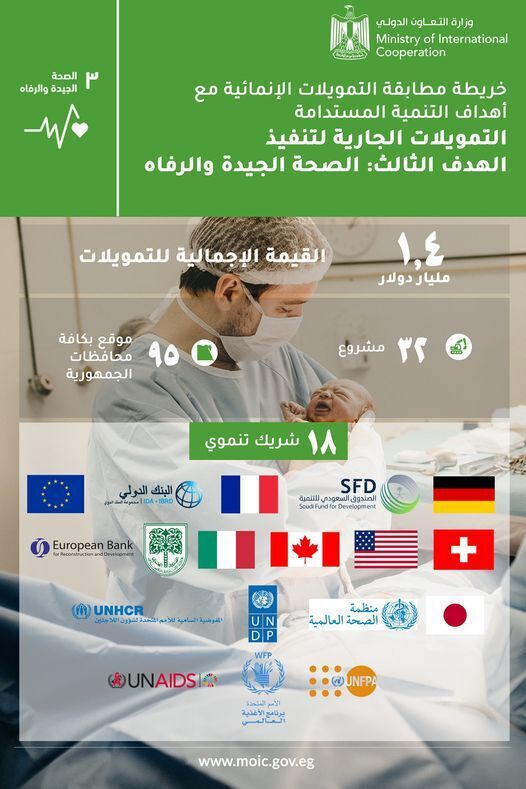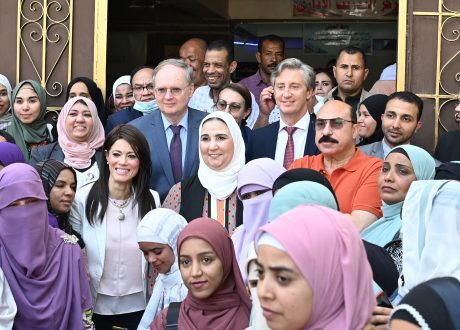
AUC, CSR Egypt team up to introduce joint certificate program in CSR
The American University in Cairo (AUC) teamed up with CSR Egypt to introduce a new ...

The Egyptian Ministry of International Cooperation revealed that multilateral and bilateral development partners channeled development financing worth $1.4 billion into 32 projects in 95 locations across all of Egypt’s governorates to enhance the health sector and improve health services provided to citizens in accordance with United Nations Sustainable Development Goal 3 (SDG 3) on Good Health and Well-being.
According to the official development assistance (ODA)-SDG map, 18 development partners provided funds worth $1.4 billion, representing 5.6% of the current financing portfolio. The amount of funding reflects how the health sector is highly prioritized by the Egyptian government that strives to improve healthcare services, especially against the backdrop of the increasing global interest in the health sector following the Covid-19 pandemic.
The financing directed to SDG 3 also contributes to other SDGs, such as SDG 1: No Poverty; SDG 4: Quality Education; SDG 5: Gender Equality; SDG 6: Clean Water and Sanitation; and SDG 10: Reduced Inequalities.
The multilateral development partners who contributed to the provision of these funds are the World Bank; the European Union (EU); the Arab Fund for Economic and Social Development (AFESD); the European Bank for Development and Reconstruction (EBRD); the World Health Organization (WHO); the United Nations Development Program (UNDP), the United Nations High Commissioner for Refugees (UNHCR), the United Nations Population Fund (UNFPA); the World Food Program (WFP); and the Joint United Nations Program on HIV/AIDS (UNAIDS). These in addition to bilateral development partners, namely Germany, the Saudi Fund for Development (SFD), France, Switzerland, the United States of America, Canada, Italy, and Japan.
The World Bank offered $530 million to develop the health system, improve the quality of health care services and manage the demand for health services and family planning.
The funding also serves the “100 Million Healthy Lives” campaign to combat hepatitis C, which will improve the health service and keep it in line with international standards, especially with the implementation of the comprehensive health insurance system in Egypt.
The Saudi Fund for Development (SFD) also provided $22.7 million to finance the establishment of basic health care units to support all citizens through an integrated health care system that encompasses better services, improved public hospitals, and inclusive health insurance.
In addition, there is the “Developing Kasr Al-Ainy Hospital” project, funded by the Saudi Fund for Development (SFD) and implemented by the Ministry of Higher Education and Scientific Research, at a total value of $120 million to upgrade the infrastructure of Al-Kasr Al-Ainy Hospital and improve the level of educational and training services provided.
The European Bank for Reconstruction and Development (EBRD) also extended $104 million to“The Kitchener Drain Solid Waste Project”.
The project is due to be carried out by the Ministry of Local Development in order to protect the public health through upgrading the Kitchener drain and improving the health and environmental conditions of residents concerned.
The project is designed to reduce pollution in the drain; construct a modern structure in cooperation with top international expertise; collect and treat domestic sewage; manage solid waste; and rehabilitate the drain’s infrastructure.
The Arab Fund for Economic and Social Development (AFESD) further dedicated $9.9 million to finance another project – “Improving National Hepatology and Tropical Medicine Research Institute” – with the aim of enhancing the health of a wide segment of citizens by developing and providing medical and specialized services to diagnose and treat liver diseases in different stages. Moreover, it targets the development of local technical and administrative capabilities to combat such diseases, reduce mortality rates, alleviate the suffering of those affected, and mitigate the adverse effects of these diseases on the Egyptian economy.
The American University in Cairo (AUC) teamed up with CSR Egypt to introduce a new ...
Egypt’s Ministry of Social Solidarity, the United Nations Development Program (UNDP) and the European Union ...
Saudi Arabia and the United Nations Environment Program (UNEP) have launched campaigns to combat desertification, ...


اترك تعليقا